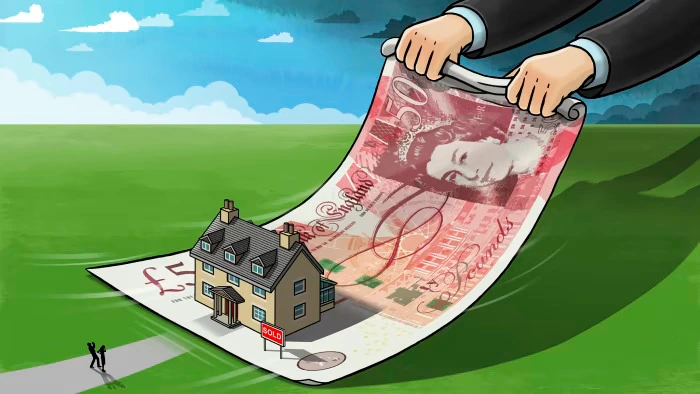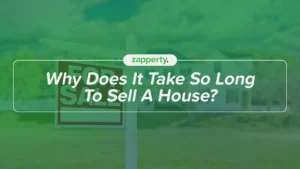Finding a desired home can be a mix of both heartening and daunting experiences. A dream come true – when perfectly put. And why not? You’ve scoured listings, visited properties and finally, you’ve found the one where you picture yourself with your loved ones.
All this sounds so perfect and flawless but if you’re amid buying a home in the UK, you’ve probably encountered the term gazumping. It’s an unfortunate reality of the property market and can be a deeply frustrating experience, leaving buyers left out in the cold, which made them feel both blindsided and financially strained. According to well-researched data, 37% of homebuyers are now being gazumped and this figure has grown by 6% in the last two years.
Buying a house is likely the largest financial commitment you’ll make in your life. It’s a stressful process, made even more complicated by the potential for setbacks like gazumping. In this article, we’ll explore what gazumping is, its legality in the UK, and the steps you can take to avoid falling victim to it. If you’re facing this dilemma, we’ve got you covered.
What is gazumping?
Let’s start with the basics: gazumping occurs when a seller accepts a higher offer from a new buyer after having already agreed on a sale price with another buyer. Imagine the scenario: you’ve made an offer on a house, the seller accepts, and you think you’re in the clear. You start arranging your mortgage, pay for a survey, and instruct a solicitor. But then, just before contracts are exchanged, the seller informs you that they’ve accepted a better offer. You’re left either raising your bid or walking away—often out-of-pocket for expenses like survey fees.
In the UK, property sales aren’t legally binding until contracts are exchanged, which is why gazumping can happen. It’s the ultimate curveball, especially after you’ve spent time and money preparing for the sale.
What is gazumping UK – some facts to know?
Gazumping UK isn’t just a rare occurrence—it’s something every UK homebuyer should be aware of. The UK housing market is very competitive. Verbal agreements are not legally binding. This means sellers can accept a higher offer. They can do this even after agreeing to sell to you.
Unlike in Scotland, where the process is more locked-in early on, the English and Welsh property markets operate in such a way that until contracts are exchanged, nothing is final. This gives room for a higher bidder to swoop in at the last minute, leaving the original buyer high and dry and in the cold. With this said, here are some key factors to know about Gazumping UK:
- Gazumping is not illegal in the UK.
- Property transactions in the UK are not legally binding until contracts are exchanged.
- Gazumping is more common in competitive housing markets where demand exceeds supply.
- Gazumping can be financially stressful and frustrating for buyers.
- The UK housing market’s reliance on a formal offer process, rather than a reservation fee or deposit system, contributes to the prevalence of gazumping.
Is gazumping illegal?
Many first-time buyers often ask: Is gazumping illegal? Unfortunately, it’s not. Although it feels unjust and unethical, it remains perfectly legal in the UK. Sellers have no obligation to proceed with the initial offer until contracts are signed.
Legally, the seller had every right to do this because the deal isn’t final until contracts are signed. This legal setup puts buyers in a tough spot. It’s easy to feel frustrated and upset, but right now, the law doesn’t protect buyers from gazumping.
Should you accept a gazumping offer?
For sellers, getting a higher offer—especially in a busy market—can feel like winning the lottery. However, just because you can accept a gazumping offer doesn’t mean you should. Before jumping at the chance for extra cash, consider:
- The new buyer may not be as ready as the initial buyer. By accepting the new offer, you could face weeks of delays.
- You may make money quickly, but gazumping can hurt your reputation with agents and other buyers later on. It’s considered an ethically questionable move in the industry.
- Especially in an unstable market, there’s a risk the new buyer might pull out too, leaving you back at square one.
Pros of accepting a gazumping offer
- There’s no denying that a higher offer means more profit.
Cons of accepting a gazumping offer
- Possible delays and complications.
- A hit to your credibility as a trustworthy seller.
- Risk of jeopardizing the entire sale if the second buyer falls through.
Gazumping Insurance
Gazumping insurance, commonly referred to as Home Buyers Protection Insurance, offers financial protection for homebuyers in case their property purchase falls through due to unforeseen circumstances, including gazumping. This insurance helps recover costs like conveyancing fees, survey expenses, and mortgage arrangement fees, which can amount to thousands of pounds when a deal collapses.
For instance, if a seller accepts another higher offer after agreeing to yours—a common scenario in gazumping—this policy can cover your out-of-pocket costs.
The insurance typically starts at an affordable price point (around £69) and has no excess charges, making it a practical safeguard against the risks of the home-buying process.
How to avoid being gazumped?
Buyers, you’re not completely powerless. While gazumping might be legal, there are several strategies you can employ to reduce the likelihood of it happening to you:
- Time is your best ally. By acting swiftly, especially when it comes to getting your finances and legal team in order, you can minimize the window of opportunity for other buyers to swoop in.
- Though not commonly used, lock-in agreements or exclusivity clauses can be negotiated. This legally binds the seller to you for a set period, preventing them from accepting a higher offer.
- Keep regular communication with the seller and estate agent. Let them know you’re serious about the purchase and moving as fast as possible.
Click for more detail about how to avoid gazumping?
The role of estate agents in gazumping
Estate agents play a crucial role in the home-buying process, and their actions can influence the likelihood of gazumping. While their main duty is to facilitate the sale, various factors tied to their involvement can either increase or decrease the chances of gazumping.
- Estate agents are required by law to inform sellers of any new or higher offers, even after an initial offer is accepted. This often leads to gazumping scenarios.
- Some estate agents may push sellers to hold out for higher bids, especially in competitive markets, creating more opportunities for buyers being gazumped.
- Poor communication between the buyer, seller, and estate agent can increase the likelihood of gazumping. Estate agents who don’t push for fast-moving legal procedures may leave more time for other offers to emerge.
- A proactive estate agent can speed up the sale by helping finalize contracts quickly, reducing the window for gazumping to occur.
- Buyers should communicate frequently with their estate agent, emphasizing their seriousness about the purchase, which might discourage the agent from entertaining additional offers.
What is Gazundering
Gazundering is the opposite of gazumping. It occurs when a buyer reduces their offer at the last minute, just before contracts are exchanged. This tactic often leaves sellers in a tough spot, forced to either accept the lower offer or risk the entire deal falling through. While less common than gazumping, gazundering can be just as frustrating and financially disruptive.
Gazumping and Gazundering: What’s the Difference?
Both gazumping and gazundering create uncertainty in property transactions, but they affect different parties. Gazumping happens when a seller accepts a higher offer from another buyer after initially agreeing to sell to you. While gazundering occurs when a buyer lowers their offer just before the sale is finalized. Together, these practices highlight the unpredictable nature of the UK property market, where agreements aren’t legally binding until contracts are exchanged.
How to Respond to Gazundering
If you’re faced with gazundering, it’s important to stay calm and assess your options. Start by evaluating whether accepting the reduced offer is financially viable. If not, consider re-listing the property or negotiating with the buyer to find a middle ground. Maintaining open communication with your estate agent can also help manage the situation and explore alternatives quickly. Also, ensuring the buyer is financially prepared early in the process can reduce the risk of gazundering.
Exclusivity Agreements
When it comes to securing your dream home, the last thing you want is to be outbid at the last minute. That’s where exclusivity agreements come into play. They provide an added layer of protection, giving you peace of mind while you work through the buying process. But what exactly are exclusivity agreements, and how can they help you avoid gazumping?
What is an Exclusivity Agreement?
An exclusivity agreement, also known as a lock-in agreement or lock-out agreement, is a legally binding contract between a buyer and a seller that prevents the seller from negotiating with or accepting offers from other buyers for a specified period. This agreement ensures you have the “sole right” to purchase the property within the agreed timeframe, helping to prevent gazumping.
Think of it as reserving your spot in line. Once you’ve agreed on terms with the seller, an exclusivity agreement locks down the deal, allowing you to proceed with your mortgage application and necessary property inspections without the looming fear of losing out.
Want to learn more about mortgage offers and how they affect your purchase timeline? Check out our blog on mortgage offer durations.
How Does an Exclusivity Agreement Work?
The process of setting up an exclusivity agreement typically involves these key steps:
- Agreement on Terms: You and the seller negotiate and agree on the length of the exclusivity period and any associated conditions.
- Legal Drafting: A solicitor drafts the agreement, outlining responsibilities such as maintaining the property in its current condition and not entertaining other offers.
- Earnest Money Deposit: In some cases, an upfront deposit (also called earnest money) is required to show your commitment.
- Finalisation: Once both parties sign the agreement, the exclusivity period begins, giving you the security needed to move forward with confidence.
Costs and Legal Considerations
While exclusivity agreements offer valuable protection, they come with associated costs and legal factors to keep in mind:
- Legal Fees: Solicitors usually charge between £500-£2,000 to draft and review the agreement.
- Earnest Money Deposits: Some sellers may require a non-refundable deposit to secure exclusivity.
- Timeframe Limitations: Typically, exclusivity agreements last between 2 to 6 weeks, depending on negotiations.
- Mortgage Approval Process: Buyers should ensure their mortgage agreement in principle is in place to avoid unnecessary delays within the exclusivity period.
The Limitations of Exclusivity Agreements
Despite their benefits, exclusivity agreements aren’t without limitations:
- No Absolute Guarantees: While they prevent the seller from negotiating with others, they don’t guarantee the sale will go through if unforeseen issues arise.
- Upfront Costs: The financial commitment required might not be suitable for all buyers.
- Limited Duration: If you encounter delays in the conveyancing process, you might find yourself out of time and back at square one.
Should You Consider an Exclusivity Agreement?
If you’re serious about buying a property and want to avoid the emotional and financial strain of gazumping, an exclusivity agreement could be a wise move. However, it’s important to weigh the costs and potential drawbacks before committing.
Imagine you’ve found your perfect home after months of searching. You’ve agreed on a price with the seller and even started preparing paperwork. Then, out of nowhere, you receive a call—the seller has accepted a higher offer. You’re left devastated, out of pocket for fees, and back to square one.
Now, picture having an exclusivity agreement in place. No last-minute heartbreak, no unexpected competition—just a clear path to homeownership. That’s the kind of peace of mind an exclusivity agreement can provide.
Alternatives to Exclusivity Agreements
If you’re unsure about entering into an exclusivity agreement, other options can help secure your deal:
- Requesting a Lock-In Agreement: A more informal arrangement that shows mutual commitment.
- Using an Inspection Clause: Ensuring the property remains as assessed throughout the buying process.
- Making a Verbal Offer Follow-Up: While not legally binding, it helps gauge the seller’s intent before formal agreements.
By exploring all available options, including exclusivity agreements, you can make informed decisions and take proactive steps to secure your dream home without the risk of last-minute setbacks.
How Zapperty can help?
Gazumping is a tough reality in the UK property market but understanding it and knowing how to protect yourself can make all the difference.
To avoid the stress and uncertainty of competing offers, turn to Zapperty. Our straightforward, hassle-free process locks in your sale and eliminates the risk of last-minute bids from other buyers. Learn how you can sell your house quickly with Zapperty and simplify your selling experience, providing peace of mind.
FAQ’s
What to do if you’re gazumped?
Sadly, if you’ve been gazumped, your options are limited. You can either try to match or beat the higher offer, or you may choose to walk away. However, be aware that pursuing a bidding war can lead to financial strain, making you question whether the property is worth the extra cost. Sometimes, walking away and cutting your losses can be the wisest decision.
Should I accept a gazumping offer?
Deciding whether to accept a gazumping offer involves your budget and priorities. If the new offer is within your financial comfort zone and you really want the property, it might be worth considering. Moreover, you could also negotiate with the seller if you’re open to increasing your offer. A pro tip here is to always consult your real estate agent to ensure your choice fits with market conditions and your personal needs.
What is gazundering?
Gazundering is when a buyer drops their offer at the last minute, just before contracts are signed. It’s the opposite of gazumping and, while less common, can be just as frustrating for sellers. It can disrupt the sales and cause complications in the process.
Can estate agents in the UK reveal other offers on a property?
In the UK, estate agents must let you know if there are other offers on the table but aren’t obligated to disclose the exact amounts. If the seller agrees, though, your agent can share those details with you. If you’re unsure about your offer, you can ask your agent to check if the seller is open to revealing the other offer amounts.
Is gazumping unethical? How so?
Gazumping, where a seller accepts a higher offer after initially agreeing to sell to you, is generally considered unethical. It can be frustrating and disruptive, as it often leaves buyers scrambling and can lead to wasted time and money. This practice undermines trust in the buying process and can cause significant stress for those affected. While it’s legal, the lack of commitment and respect for initial agreements makes it widely regarded as unfair.
How to gazump successfully?
To gazump successfully, act fast, offer more money and ensure your finances are ready. A less complicated, flexible offer is more attractive to a seller than one that comes with additional conditions. Being prepared to exchange contracts quickly and working with an efficient are other ways to gazump successfully and increase your chances of a sale. However, it’s worth noting, be aware that gazumping can create ethical and legal concerns depending on the market.





